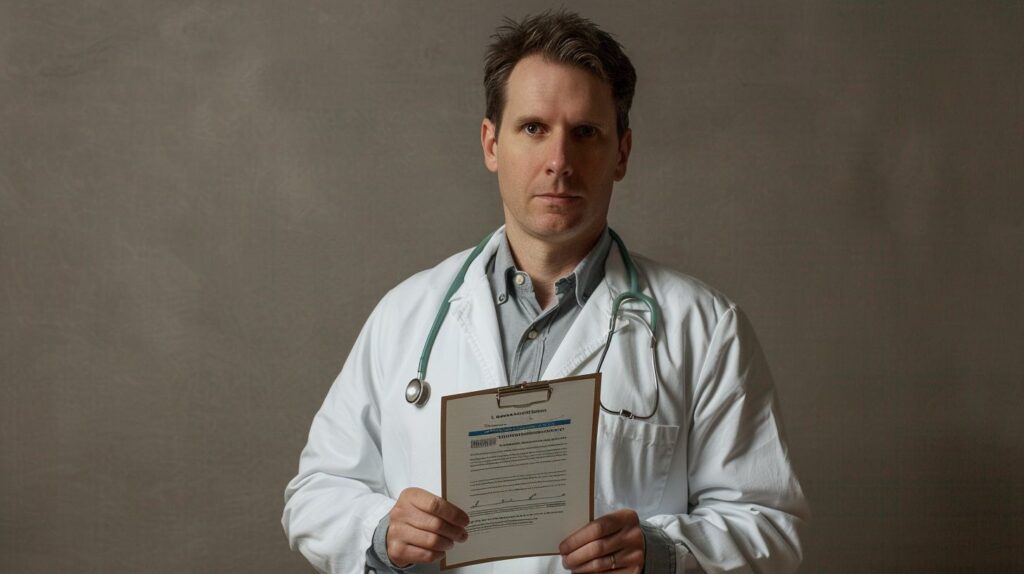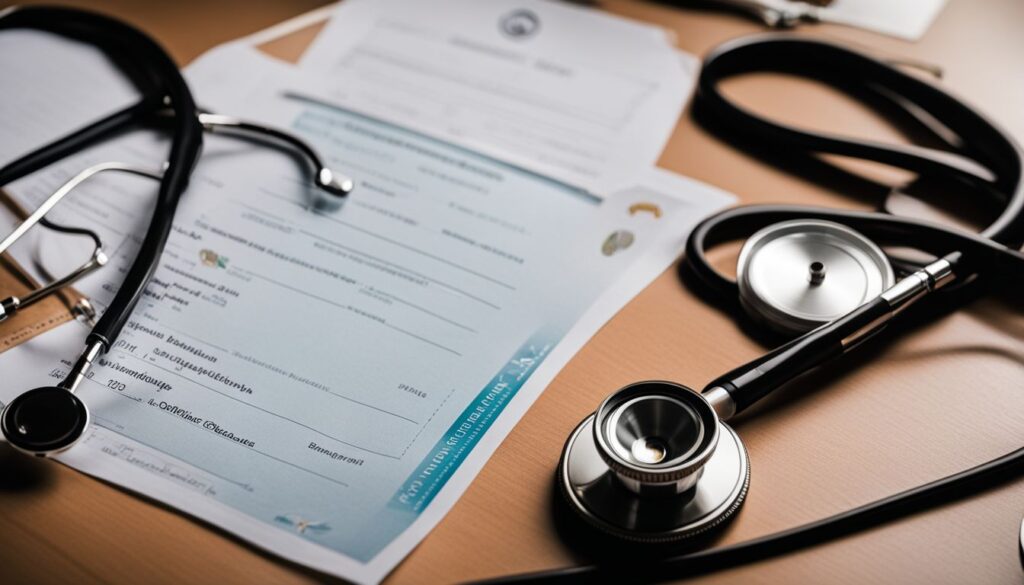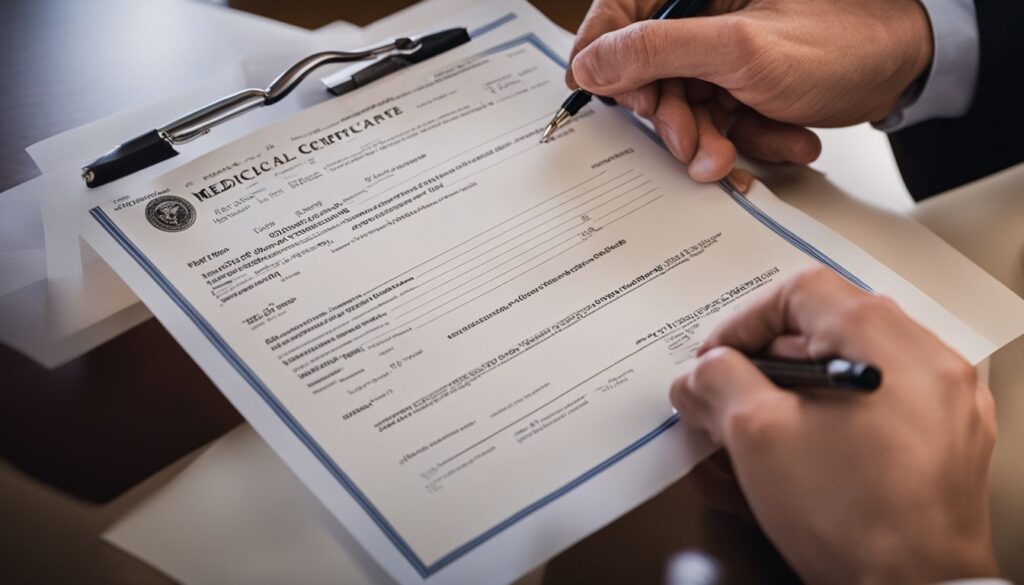What Is The Importance of a Medical Certificate?
We provide you with a hassle-free way to get sports medical certificates online
✓ Apply 24/7 online
✓ Avoid long appointment wait-times
✓ Apply directly from your phone
✓ Signed by a fully registered GP
✓ Sent to your inbox with optional overnight service




What Is The Importance Of a Medical Certificate

Feeling confused about why you need a medical certificate? A medical certificate is vital in various professional and personal scenarios. This article will guide you through its importance, from legal requirements to job applications.
Keep reading to find out more!
Key Takeaways
- Medical certificates show if someone is fit for work, court, or other activities. They need details like doctor’s contact, patient’s information, and health condition.
- Courts use medical certificates to decide if people can miss legal proceedings. Doctors might have to explain these documents in court.
- Jobs often ask for medical certificates to make sure new employees can handle their duties safely and effectively. This is especially true in fields requiring good physical and mental health.
Understanding a Medical Certificate

A medical certificate provides proof of a person’s health condition following an examination by a healthcare professional, such as a GP or a hospital doctor. This document often details the results of physical examinations, diagnoses made, and any medical care or assistance provided.
It acts as an official record that confirms whether someone is fit for specific tasks like work, sport, or appearing in court.
Doctors must comprehend the request’s nature before issuing these certificates. They need to know why it is needed and how it might be used. Courts scrutinise these documents closely to avoid delays caused by unnecessary adjournments.
Therefore, providing accurate and clear information is crucial in helping justice being served efficiently. The guidance from GMC’s “Good Medical Practice” helps doctors understand what should be included in a medical certificate – this includes the date of examination and detailed reasons for the patient’s condition or inability to perform certain activities.
Purpose of a Medical Certificate in Court

Medical certificates play a crucial role in court by excusing witnesses, jurors, and defendants who are unable to attend due to health issues. Courts examine these documents closely to prevent unnecessary delays and additional costs.
They might even call the doctor who issued the certificate to give evidence in court. This ensures that everyone’s time is respected and that justice proceeds without undue hindrance.
The Crown Prosecution Service (CPS) outlines specific details that must be included such as the date of examination and a detailed explanation of why the person cannot appear in court.
Accurate and objective medical information supports fairness in legal processes. Next, let’s delve into what exactly goes into these important documents with “Contents of a Medical Certificate”.
Contents of a Medical Certificate

A medical certificate is a vital document that provides evidence of a person’s health condition. It needs to contain specific information for different purposes like sick leave, court appearances, or insurance claims. Here’s what you can expect to find in a typical medical certificate:
- GP or Specialist’s Contact Details: The document starts with the name, address, and contact information of the general practitioner (GP) or specialist who assessed the patient.
- Patient’s Details: Information about the patient, such as their full name, date of birth, and address ensures the certificate relates to the right individual.
- Date of Examination: This is when the GP or specialist saw the patient. Courts particularly look for this date to assess timeliness and relevance.
- Medical Diagnosis: Although detailed health information is sometimes kept confidential, a broad diagnosis or description of the patient’s medical condition is necessary.
- Impact on Activities: Specifically, how the condition affects work or daily activities. For court purposes, it must clarify if someone is unfit to attend rather than just unfit for work.
- Expected Recovery Time: An estimate of when the patient might return to their normal activities helps employers and courts plan accordingly.
CPS guidance clarifies that for court cases, a medical certificate should include reasons why one cannot attend court and an indication of likely recovery time.
Understanding why getting a medical certificate is important comes next.
Importance of Obtaining a Medical Certificate

Obtaining a medical certificate is crucial for verifying your health status and meeting employment requirements. It also holds legal ramifications in certain situations.
Verifying Health Status
Verifying health status with a medical certificate is crucial for both patients and healthcare providers. It ensures that individuals get the right medical care and support they need.
Courts also rely on these documents to make informed decisions, avoiding delays caused by unnecessary adjournments. This process involves providing accurate and objective information, which helps in the pursuit of justice.
Next, understanding the legal ramifications of medical certificates is vital.
Legal Ramifications
Moving from the need to verify health status, it’s crucial to understand the legal side of medical certificates. Courts might ask doctors who issue these certificates to appear and give evidence.
This is because a medical certificate plays a key role in legal matters, like showing why someone can’t come to court. If a doctor gets summoned and doesn’t show up, they could be committing a crime.
Being part of the legal process means following strict rules. For instance, the CPS outlines what information has to be in a medical certificate, such as when the check-up happened and details about the illness.
Doctors failing to meet these standards might find their notes rejected by courts. It shows that honesty is vital when doctors write these reports for court use, helping justice along its way.
Employment Requirements
Following the discussion on legal ramifications, it’s essential to consider how medical certificates play a crucial role in employment. Many jobs ask for a medical certificate before they hire someone.
This proves that the person is fit for work and doesn’t have health issues that could prevent them from doing their job well. Employers, including human resources departments, need this info to make sure new employees can safely do the tasks their job requires.
In certain professions, like nursing care or when becoming a certified medical assistant, showing you’re physically and mentally healthy through these certificates is even more important.
It ensures patients receive safe and competent care. The document must include relevant health details verified by a GP or another licensed physician. This step protects both workers and those they serve by upholding high standards of health and safety at work.
Conclusion
Medical certificates play a key role in many areas of life. They prove health status for jobs, school, and travel. This document helps people get the right treatment and support they need.
It also makes dealing with work or school absences smoother. Overall, medical certificates are vital for health, legal, and employment matters.
FAQs
1. What is a medical certificate?
A medical certificate is a document from your doctor, like your GP or family doctor, that shows you were sick or had a health check. It’s important for work, school, and some activities.
2. Why do I need to show a medical certificate?
You might need to show one if you’re sick and can’t go to work or school. It proves you were ill. Sometimes, it’s needed for health benefits at work or to help with medical expenses.
3. Can getting a medical certificate help with my job?
Yes! If you’re unwell and can’t work, showing your employer this note means you could get time off without losing pay. Plus, it helps if there are any issues about being absent due to sickness.
4. How does my doctor decide I need a medical certificate?
Your doctor will talk to you about how you feel and might do some checks or tests. They look at your physical and psychological health before deciding.
5. Is everything in my medical certificate kept private?
Absolutely! Medical ethics demand that all your information stays confidential between you and your healthcare team.
6. What other reasons might I need a medical certificate for besides being sick?
There are many reasons like needing special care during pregnancy, managing long-term illnesses like diabetes or heart disease, proving physical fitness for sports pilots or drivers’ licenses, and even when applying for certain jobs in the healthcare field.
